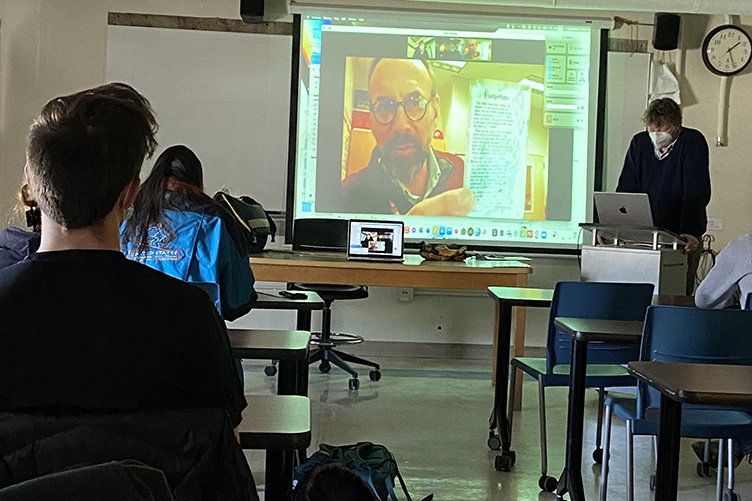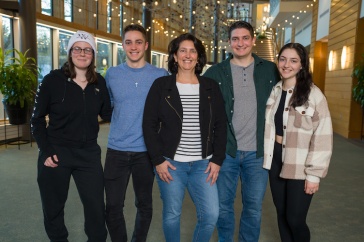
Joseph Doucette holds up a card featuring The Footprints in the Sand poem, one of the items in the wallet he'd lost more than 30 years ago, during a recent Zoom visit to the UNH class that discovered and returned the wallet. The poem was given to him by his grandmother.
Adapting to encountering the unexpected is a significant part of the curriculum for those in UNH’s wilderness emergency medical care course. But the events of a March 23 meeting of the class will likely leave a particularly unique impression on all of the students – and one high school assistant principal more than 3,000 miles away.
As he lay on the ground near the Whittemore Center to perform a demonstration about spinal cord injuries, Nate Alexander ’22 spotted a wallet about a half inch under the soil nearby. Brent Bell, associate professor of recreation management and policy and instructor of the course, figured it was probably lost not long ago by a former student or an alum on their way to a hockey game, so he brought the wallet – which was damp and full of dirt – home to dry out.
Things didn’t really get interesting until Bell began sorting through and peeling apart the artifacts that remained inside, where he discovered a blood donor card.
Expiration date: 1988.
“It looked like it had been lost in the 80s, and I was kind of excited about that because that was before they built the hockey arena – there has been all kinds of construction in that area between now and then,” Bell says. “So it was kind of an amazing find.”
The wallet also contained a still-legible Air Force ID, and from there it only took a few hours of crowd-sourced social media sleuthing and one email message to uncover the rightful owner as Joseph Doucette – a school administrator in Bellingham, Washington who had no apparent connection to UNH.
As it turns out, Doucette had twice visited UNH for woodsmen competitions from upstate New York as a college student during the 1980s and had apparently left his wallet behind by mistake on one such trip – though he has no recollection of losing it.
Bell mailed the wallet back to Doucette, who determined after speaking with friends and teammates that they had been on campus for woodsmen competitions in the spring of 1985 and the spring of 1987, and the wallet had to have been lost during one such visit.
Doucette joined Bell’s class via Zoom on Wednesday to talk with the students about the fascinating find.
“I can still picture the campus and the friends I was with at that time,” Doucette says. “It brought me back 36, 37 years ago … a flood of memories from that formative time in my life. To be reunited with (the wallet) gave me a sense that perhaps it never really left me, but was simply waiting to be found.”
That the wallet survived more than 30 New England winters, an assortment of construction projects and the impact of countless student footsteps over the years is something of a marvel. And the fact that it was so simple to track down its owner – Bell says it took only a few hours after a Facebook post for Doucette’s name to emerge, and a quick web search unearthed his school email address – is an equally remarkable illustration of the ways in which people are connected in the digital age.
Indeed, Bell found a man who was roughly 3,200 miles – or just short of a 50-hour car ride – away in the hours between 6 p.m. and bedtime the day his students discovered the wallet.
“I love how connected we all are,” Bell says. “It’s pretty amazing how easy it is to find each other. It really validates our 5.2 degrees of separation.”
That number is the more precise representation of the well-known “six degrees of separation” theory that illustrates how many “hops” there are between any two people. A recent study estimated that in the Facebook era, that number is closer to 3.5.
Still, some connections can’t be measured digitally. Although most of the contents of the wallet were intriguing but relatively unremarkable, Doucette was touched to find that a card featuring the text from The Footprints in the Sand – an inspirational religious poem – was intact and legible.
It was a moving reminder of his grandmother, who passed away in 2003.
“She gave me the card and I carried it in my wallet,” Doucette says. “She was a very faith-oriented person whom I revered and respected greatly.”
Bell says he enjoyed the “message in a bottle” spirit of the story, and there are indeed plenty of it’s-a-small-world vibes involved. Doucette worked briefly in the White Mountains of New Hampshire alongside someone from UNH (the name escapes him) before moving west, and Ben Fish '24, a student in Bell’s class, knows two people who graduated from the school Doucette works at in Washington.
Doucette had developed a love of the outdoors before he visited UNH – woodsmen teams used to camp in the fields on campus during competition weekends – and he remains very active in Washington, where he is near mountain ranges and volcanoes and extensive outdoor recreation like skiing, sailing, kayaking and mountain biking.
And though the conversation between Doucette and the students was brief, he was grateful for the return of the wallet and the ensuing exchange – which may have opened the door to removing a few more degrees of separation.
“If you’re ever out this way, I’d be happy to take you up a mountain,” Doucette amiably said to the students.
-
Written By:
Keith Testa | UNH Marketing | keith.testa@unh.edu



















































